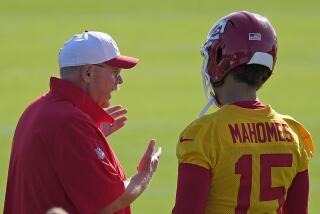NFL Is Keeping L.A. in the Dark
The New England Patriots (6-0), aiming for formidable Pittsburgh (5-1) today and for erratic but ever dangerous St. Louis (4-3) next week, are still the class of the NFL for one overriding reason: Their leader, Bill Belichick, is the league’s only all-out passing coach.
Throwing on first down 11 times in their first 15 offensive series last Sunday, the Patriots just did turn back the New York Jets (5-1), 13-7.
But the large mass audience of Los Angeles didn’t see it on network TV, which presented the Chargers instead (on CBS). If the policy dictating such a decision hurts L.A. football fans, it hurts the NFL more. It could well cost the league TV rating points -- translating, eventually, to rights-fee dollars.
Indeed, if this policy is continued, the loss will be felt in the league’s next television contract with the networks. The huge Los Angeles area is big-game country. Sports fans here don’t like to miss the very best.
Historically, Los Angeles has always had a low tolerance for second-best. At the same time, there are some L.A. viewers for the Chargers, Raiders and others. But to the thoughtful majority, there isn’t a lot of general interest in games involving the 2-5 Raiders, the 4-3 Chargers, or even the 2-4 Dallas Cowboys, all of whom are viewed as second-rate.
How do you build NFL interest by scheduling second-rate attractions in top-rated L.A.?
Big Games Wanted
The millions of people residing in or near Los Angeles and its suburbs aren’t always easy to read or understand. It is often said, for instance, that to sell them anything, you have to give them a winner -- but that isn’t quite it.
The nation’s No. 1 college team, undefeated USC, attracted sellout 90,000-plus crowds to the historic Coliseum for October games against two top-15 opponents -- and won both games. But it couldn’t interest L.A. in second-rate Washington last week, attendance falling to about 73,000.
A more famous example is the first Super Bowl, the 1967 game that was also played in the Coliseum. To this hour 39 years later, it’s the only Super Bowl that didn’t sell out -- for reasons that are not well understood in the rest of the country.
The precise problem in 1967 was that the Super Bowl, in the view of L.A. sports fans, didn’t seem to be a big game. The event of that season was the NFL title game, Green Bay at Dallas, matching Hall of Fame coaches Vince Lombardi and Tom Landry.
Uncharacteristically, Lombardi threw the ball all day to barely win one of the great pro games ever played, 34-27.
L.A. sports fans, who watched it closely on television, couldn’t get interested in attending a lesser attraction later that month, the Super Bowl, which drew a crowd of 61,946.
The key to understanding Los Angeles is figuring out what L.A. fans perceive to be big time. And in that respect, the NFL, every seven days, has a rare opportunity to build interest in its product. Each Sunday, on the NFL schedule of 13 games, one or two are likely to stand out -- as the Jets at New England did last week. Short term, it may help the second-rate Raiders or Chargers to show them to L.A. But why should the NFL think second-rate or short term? The payoff is on long term and first-rate.
Special Plays Count
The Patriots tuned up for today’s matchup against the hot Pittsburgh rookie, Ben Roethlisberger, with their narrow victory over the division-rival Jets.
Played in Foxboro, this was the game that introduced the Jets as a team that’s beginning to look like the Patriots, who have won 21 in a row with quarterback Tom Brady. If New England’s definitive ingredients are Belichick, Brady and defense, New York’s are Coach Herman Edwards, quarterback Chad Pennington and defense.
And it’s because these AFC East leaders are both equipped with powerful defensive platoons that a Brady-Pennington passing duel could be low-scoring.
Belichick pulled it out as the more dedicated passing coach. He was the first of the NFL’s great defensive coaches to convert to passing as the way to proceed on offense. He saw the light in the 2002 Super Bowl, which, as a defensive expert, he tried to win with defense.
The then-pass-mad St. Louis Rams caught him, however, just before the end, 17-17, after which, at the very end, Brady’s surprisingly accurate passing bailed out Belichick.
Belichick has never forgotten that day. In order to win an NFL-record number of consecutive games, he has modeled the Patriot offense on that of the Rams’ great 2000-2002 passing teams while, simultaneously, continuing to tighten the Patriot defense as only a lifelong defensive master could do.
In a parity era, this combination -- the right offense and right defense -- has enabled Belichick to win with more success than any other NFL coach in, incredibly, 85 years.
He never takes anything for granted. The Patriots couldn’t have won the Jet game if, after hours of studying the Jets, they hadn’t been ready with two big special plays aimed specifically at the New York players:
* On offense, to set up their only touchdown, the Patriots went 24 quick yards to the Jet seven-yard line on the play known as a square-in-and-go pass, Brady to halfback Kevin Faulk -- a play so rare that some of the most attentive old pros had never seen it. Ordinarily, this is a pattern that develops as a square-out-and go pass designed to evade a defensive safety when completed outside to a wide receiver. Obviously, the Patriots knew that the Jets wouldn’t expect a running back catching one inside there, down the middle.
* On defense, terminating the Jets’ big threat of the second half, Belichick obviously knew they would opt for a do-or-die bomb to wide receiver Wayne Chrebet. Ending it all for Pennington in this game, the Patriots had the man double-covered.
Here Come the Jaguars
The Jacksonville Jaguars (5-2), playing the surprisingly strong Houston Texans (3-3) today, will be out to verify what they seemingly proved in last week’s 27-24 upset win over quarterback Peyton Manning at Indianapolis (4-2) -- that they’re a coming team, sound and solid, as coached by a 1980s four-year starter at USC, the old linebacker Jack Del Rio.
The least experienced head coach in the league, Del Rio is nonetheless an experienced defensive coach who is proceeding in the footprints of Belichick and Edwards. That is, he has wedded an effective defensive team to a skilled young passer, Byron Leftwich.
So far, Del Rio doesn’t really trust Leftwich, who therefore has to keep coming from behind. It’s clear, though, that his coach is learning.
In Los Angeles, the Colts and Jaguars drew few witnesses, but if you’ve seen one Colt game, you’ve seen them all. As restrained by one of the NFL’s most conservative coaching staffs, Manning, one of the great passers of our time, has to stand around every Sunday while his coaches try to establish their running game -- much as it was done everywhere in the 1960s.
To most folks, the 1960s were long ago, but not to the Colts.
The talk after the Jaguar-Colt game was about the 53-yard field goal that won it at the end, but the Colts never should have been in position to lose to that team on any kind of play. They surely understood that Del Rio was no more willing to throw the ball than they were. Why not throw it before Del Rio woke up?
On offense, Indianapolis’ personnel is unexcelled. In fact, the Colts could run the table if they’d send Manning out passing every week and aim to hand the ball to running back Edgerrin James only when the opponent lines up to stop Manning.
It’s Indianapolis’ tough luck, of course, that in a down year for Tennessee, the upstart Jaguars are coming up in the same division. But coming up they are, and the rest of the league, if not the Colts, needs that. This is a league harboring too few sound coaches and sound teams.
Bengals Not Bad
The Cincinnati Bengals abandoned their conservative ways for one brief, bright moment in the second half Monday night, and that, clearly, appealed to their powerful-armed, on-target passer, Carson Palmer. Told to throw it, Palmer, starting at his 20-yard line, hit four big ones -- three on first-down plays -- to usher the Bengals all the way to the Denver 36.
There, as the Broncos moved at last into what had the look of a foolproof pass defense, the Bengals crossed them up with a call for a quick off-tackle sprint by Rudi Johnson, their classy running back, who went the distance on the Cincinnati signature play that doomed Denver in an astonishing upset, 23-10.
In his first NFL appearance on national TV, Palmer, the Heisman Trophy winner from USC, seemed all the way a first-class NFL quarterback. Even when the Broncos came at him with a fierce third-down rush whenever Cincinnati failed on successive running plays, Palmer remained smooth, cool and clear-headed. An accurate passer at every range, he was most of all marked as a pro quarterback by his long-ball touch -- a rare quality in any league.
Marvin Lewis, the Cincinnati coach who held him out of every game last season, has so much confidence in Palmer now, obviously, that he sent him on one attack after another at cornerback Champ Bailey, the key figure in the new Denver defense and the most talented. This had an immediate payoff when Bailey slipped and fell as Palmer unloaded his longest pass of the first quarter to wide-open wide receiver Chad Johnson on a 50-yard play scoring the first (of two) Cincinnati touchdowns. Thereafter, Palmer and Chad Johnson harassed Bailey repeatedly.
When Bailey intercepted one at the goal line to prevent a third Cincinnati touchdown, the fault was not Palmer’s but a Bengal coach’s. Against a heavy blitz, it was a third-down slant pass with nine yards needed. No cornerback can anticipate and get to a slant pass in time to intercept when the play is called at the right moment against the expected defense.
As coached by Lewis, a superb organizer and motivator and an obvious gentleman, the Bengals showed off numerous players who are better than their record, which was 1-4 going in compared to Denver’s division-leading 5-1. Among the Cincinnati standouts are Palmer, Chad and Rudi Johnson, their offensive line, defensive end Justin Smith and other defensive players.
Their principal problem now that Lewis has fixed most things is that they call plays as conservatively as the NFL’s many other losers. Their handful of long-pass attempts when the game was on the line in the first half didn’t constitute a pass offense. When their coaching staff loosens up, their new quarterback can make the Bengals a winner.
More to Read
Go beyond the scoreboard
Get the latest on L.A.'s teams in the daily Sports Report newsletter.
You may occasionally receive promotional content from the Los Angeles Times.









